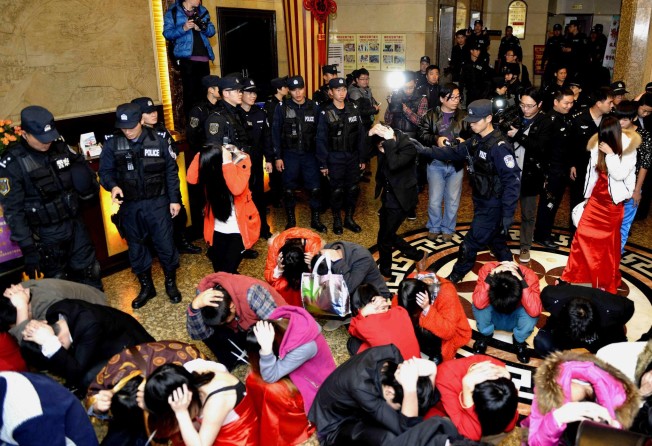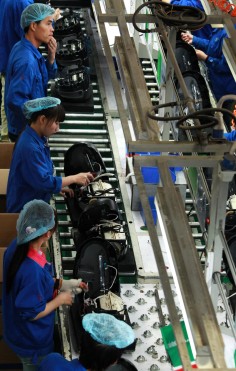
Crackdown on Dongguan sex trade leaves wider economy in slump
Manufacturing hub has been hit hard by a crackdown on once-thriving sex industry, which was the engine that powered much its economy

"Li Hong, sister, how long do you think it will last?"

"I have just been sitting and playing mahjong since February. I haven't earned a cent," she said.
Bingbing's friend, Li Hong, looked gloomy. In her 30s, she wore a low-cut dress and jeans. The pair tucked into their food on Swan Lake Road, once one of the city's notorious red light districts.
"I heard it will last at least three months," Li said. "I don't think we'll have any good days until July or August."
Prostitution was once rife in Dongguan, a former industrial hub in Guangdong province that welcomed the sex trade after its manufacturing industry tumbled in the wake of the global financial crisis in 2008.
No one knows exactly how many people worked in the sex industry. Local analysts estimated there were more than 250,000 prostitutes at its peak, and that the business generated about 50 billion yuan (HK$63 billion) a year.
The city was linked so closely with the illicit trade that Dongguan starred on the silver screen in a 2012 movie called Due West: My Sex Journey, a screen adaptation of an erotic online novel about a young Hong Kong man's adventures seeking sex services.
But Dongguan's red lights began to go dark in February. Authorities started a campaign to wipe out prostitution after state television reported on the city's flourishing sex industry.
Some 6,500 police raided almost 2,000 entertainment venues and arrested 162 people. Dozens of local officials were suspended, accused of turning a blind eye to vice. Provincial authorities say the campaign will continue until next month.

"Some girls have already gone to neighbouring cities and areas - Foshan, Sanshui and Huizhou - and had a look at the nightclubs and hotels there," Bingbing said. "The men there were locals, so ungenerous and mean, much worse than clients in Dongguan. To be honest, nowhere is better than Dongguan in this industry."
Li and many hotel managers estimated that up to 70 per cent of prostitutes had left the city.
"The crackdown may not kill us, but it will kill [the nearby town of] Changping and then the city itself. Without our xiaojie, Changping is going to be a ghost town," Li said, using the slang term for prostitute.
The question of when the vice crackdown will end is not just conversation among sex workers. Many people working in the city's retail and service sectors - from taxi drivers to snack sellers, landlords to restaurant bosses - grumble that their business has suffered since the prostitution raids began.
Xie Runmei, a property agent in Swan Lake Road, said rents for two-room apartments had dropped from 1,200 to 1,000 yuan. One night's stay at the nearby Manhattan Hotel costs about 178 yuan. Last year it charged 298 yuan, Xie said.
"Even our landlord would like to cut the rent to make sure we won't shut down our business." Xie said. "Many xiaojie and hotel waitresses and waiters have gone."
At the New South China Mall, the largest shopping centre in the world when it opened in 2005 with more than 2,000 shops, at least half the stores are vacant.
"Our shops are almost empty these days," said a shop assistant at a clothing store.
Adding to the gloom, Dongguan's already beleaguered manufacturing sector is finding it harder to attract migrant workers because of low wages.

Before the global economic crisis, the city's 23 five-star hotels were filled with global business travellers who came to trade with tens of thousands of manufacturers of shoes, clothing, textiles, furniture and toys.
Once the recession hit, the city's economic output slowed. Its 18.1 per cent growth rate in 2007 sputtered to 5.3 per cent in 2009 and 6.1 per cent last year.
Foreign orders withered. Small and medium-sized factories left the city after costs for raw materials, labour and rents soared.
Workers fled. Most factories saw as many as 40 per cent of workers quit their jobs at the end of last year and many did not return, said a recruitment agent for companies at the Tongsha Industrial Park in Dongcheng district.
Official statistics on the exodus were not available. But one million subscribers in Dongguan cancelled their mobile phone numbers between August 2011 and January 2012, according to Gao Hanguang, a member of Dongguan's Chinese People's Political Consultative Conference, the Nanfang Daily reported.
With those factories went the business travellers. The average occupancy rate of Dongguan's five-star hotels dropped from 90 per cent in 2007 and 2008 to about 60 per cent currently, according to the Yangcheng Evening News.

Dongguan's labour department said last month the city still needed at least 100,000 more workers, even though most factories had raised the minimum wage from 1,300 yuan a month to 1,500 yuan. The majority of migrant workers can now earn between 3,000 yuan and 4,000 yuan a month.
"Most factories had 30 or 40 per cent of workers quit their jobs at the end of last year and many of them did not come back to Dongguan this year," said a recruitment agent for companies at the Tongsha Industrial Park. "We have found increasing numbers of workers have left the city in recent years and never came back."
"I think the crackdown won't last long if the government wants decent economic growth," said Xiao Gongjun, a factory owner and a popular blogger in Dongguan. "If increasing numbers of migrant workers keep leaving, no matter if they are in the sex industry or manufacturing industry, it will definitely deal a blow to Dongguan's service industries, which account for more than 60 per cent of the city's GDP."
Lin Jiang, dean of the finance and taxation department at Lingnan College at Sun Yat-sen University and a consultant to the Dongguan city government, agreed.
"It would be bad for any city if the migrant population continues to leave and it becomes a long-term trend," Lin said. "Foreign customers will cut orders as factory owners reduce their factories' sizes. Restaurants will close, while property prices will slide."
Back in the city's red light districts, there is evidence that the sex trade is slowly reviving. Saunas and massage parlours are still closed, but a few karaoke bars have quietly reopened. About a dozen nightclubs were open on Swan Lake Road. At 5.30pm, many women in provocative dresses and heavy make-up walked the streets.
At the snack stall, Bingbing says she'll stick it out.
"I went into the City Dancing Club last night and had a look," she said. "The business was still not good, only three tables of clients, but it's a start."
